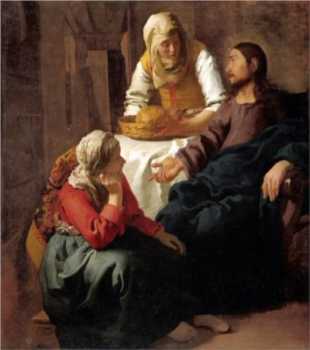 Both of the stories from today’s Gospel selections tell about Saint Martha’s encounters with Christ. The one that really makes me stop and think is the second selection, from Luke. In that story, Martha was “burdened with much serving,” so she went to Jesus and said, “Lord, do you not care that my sister has left me by myself to do the serving? Tell her to help me.”
Both of the stories from today’s Gospel selections tell about Saint Martha’s encounters with Christ. The one that really makes me stop and think is the second selection, from Luke. In that story, Martha was “burdened with much serving,” so she went to Jesus and said, “Lord, do you not care that my sister has left me by myself to do the serving? Tell her to help me.”
Reading that makes me smile, probably because Martha’s sassy attitude reminds me of my own no-nonsense wife. (The continuation from today’s selection of Gospel of John — the story of the raising of Lazarus — has another great Martha line: “Lord, by now there will be a stench; he has been dead for four days.” Straight and to the point, Martha is!)
Anyway, compare Martha’s plea from Luke to other exhortations to Jesus throughout the Gospels:
- “My daughter is at the point of death. Please, come lay your hands on her that she may get well and live.” [Mark 5:23]
- . . . two blind men followed [Jesus], crying out, “Some of David, have pity on us!” [Matthew 9:27]
- “Teacher, I beg you look at my son . . . For a spirit seizes him and he suddenly screams and it convulses him until he foams at the mouth . . .” [Luke 9:38-39]
- “Jesus, tell my sister to help me get snacks!”
One of these things is not like the other . . .
Of course, Jesus does teach us to go to the Lord with all our concerns, great and small, so we shouldn’t think poorly of Martha for doing exactly that.
What I find interesting is Jesus’ reaction to Martha. If you read other parts of the Bible, you might well expect Christ to agree with Martha and tell her sister to help out. After all, there are plenty of proclamations in Sacred Scripture against laziness (Proverbs 6:6, Colossians 3:23, and 1 Timothy 5:8 as three examples). The penumbra of the Gospels also talk about the importance of hospitality toward Jesus: “For I was hungry and you gave me no food, I was thirsty and you gave me no drink, a stranger and you gave me no welcome . . .” (Matthew 25:42-43). Jesus says don’t treat strangers inconsiderately, so how could we possibly consider treating Christ Himself inconsiderately?!
But, no, Jesus comes down firmly on the side of Martha’s sister: “Mary has chosen the better part and it will not be taken from her.” Poor Martha!
However, it’s important to look at what Christ says before telling Martha she’s wrong: “Martha, Martha, you are anxious and worried about many things. There is need of only one thing.”
That’s the significant bit Jesus is trying to teach us. Jesus sensed that Martha was so worried about being a good host, she was losing sight of what was really important: Namely, that God Himself was willing to take some time to chat.
Does this sound familiar in your lives? How often do we worry about whether our outfits for church are pristine and appropriate, rather than spending time ensuring our hearts are ready? How much do we fret about the cleanliness of our home when our parents visit, rather than actually spending time with them? How many people work excessively long hours to make more money to provide material comforts for their family, at the expense of actually spending time with them?
What could Martha have done differently? I’ve written before about the importance of communication, and it’s still vital. Before puttering around the kitchen, Martha could have asked, “Does anyone want snacks or a drink?” If the Lord had said “No, thank you; have a seat!” then the whole situation would have been short-circuited. (Of course, then we wouldn’t have learned this valuable lesson, so maybe everything does happen for a reason . . .)
However, the lesson here is more basic: Relax. Only God is in charge of world. Recognize when the Lord is especially with you, and drop your worries to make the most of that moment. If you’re not sure what to do, ask questions.
As one more observation: I can’t help but read Christ’s use of her name twice — “Martha, Martha . . .” — in any way other than a loving headshake and a smile. His entire “scolding” feels so warm and loving to me. In comparison to the firmly worded rebukes Christ issues against the hypocrites and false believers, His correction of Martha is nothing but compassionate. I sense Jesus knows Martha is trying to do the right thing, but she just hasn’t thought it through. To quote the Beatles, “You can get it wrong and still you think that it’s all right.” We’ve all been there, trying to do the right thing and it turns out to be a mistake. God can correct us in those situations, but it will always be with love.
God wants our hearts, and we should be ever trying to get closer to doing His will, closer to Him, closer to love, closer to perfection. We can’t see the finish line on this side of life, but the journey is what’s important. Like Martha, we will stumble. Like Martha, we can be true to ourselves and our personalities and try to do the Lord’s will . . . and when we fail, know that the Lord corrects us with love.
